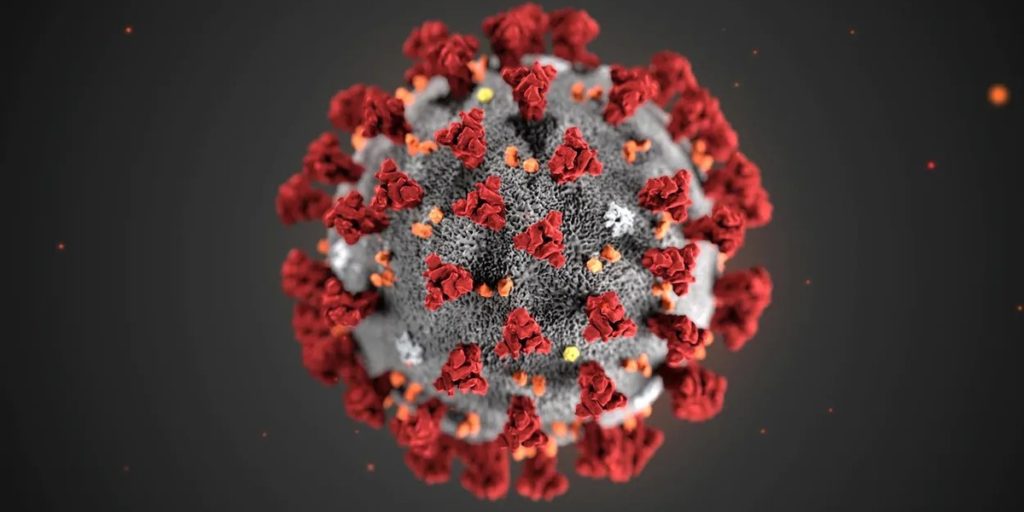COVID-19, short for coronavirus disease 2019, has taken the world by storm in almost every sense – many people have been infected with the SARS-CoV-2 virus, it’s created shopping pandemonium in stores, and many people are isolated at home. But behind that frenzied storm, scientists around the world have been working tirelessly to move research forward at an unprecedented speed so that we can understand the virus and develop a treatment or vaccine. How does this situation affect the HD community? And what does COVID-19 mean for HD research?
What does COVID-19 mean for HD patients and families?
A key question for many in the HD community right now is: Am I, or is my loved one, at greater risk for COVID-19 because of HD? The answer to that is – it depends. On its own, having the genetic mutation that causes HD doesn’t make anyone more or less susceptible to COVID-19 than someone without HD.
What would make an HD individual more susceptible to COVID-19 is if they had any underlying conditions that put them in the “high-risk” category. Those can be as obvious as having asthma or being a smoker. But this can also include HD individuals who are symptomatic since we know that swallowing, clearing secretions from the lungs, and self-understanding of limitations can be impaired by HD.
Advice from various global HD organizations can be found here:
•https://www.hda.org.uk/getting-help/covid-19-information-advice
•https://hdsa.org/wp-content/uploads/2020/03/COVID-Statement-3-18-20-final.pdf
To stay safe and healthy we should all continue doing what the WHO recommends – wash our hands regularly for 20 seconds with hot water, clean surfaces with a disinfectant, and practice social distancing. Social distancing means only coming in contact with members of your household and only going out for essential things, like an essential job, grocery store run, or to get medication from the pharmacy. Everyone should also remain vigilant for the symptoms of COVID-19, which include fever, a dry cough, shortness of breath, and fatigue.
Some HD patients at particularly high risk may need to isolate themselves even more strictly. You should seek advice from the above sources and your health provider if you are concerned.
What does COVID-19 mean for HD research?
Many scientists who usually spend all day in the lab studying HD have been asked to stay home so that they can practice social distancing and remain safe. This means that HD-related research will slow for the short time during this pandemic. A big concern is ensuring that precious samples are kept safe, and experiments that had to be shut down were paused in a way that preserves them to be restarted once it’s safe to hang out in the lab again.
While HD researchers may not be going into lab every day, they’re still hard at work to combat this disease. They may not be doing experiments at the bench, but they’re reading papers to develop their next idea, compiling data to better understand HD, and writing papers to disseminate what they’ve learned to the world. The labs may be quieter, but HD researchers are still hard at work in their fight against HD.
What about clinical trials?
With many countries’ entire healthcare systems turned over to providing care for people with COVID illness, and many doctors and nurses diverted from research into frontline care, an impact on Huntington’s disease clinical trials is inevitable. However, all those involved are doing everything they can to minimize the impact and carry on with whatever trial activity they can.
In practice, the impact will vary quite a bit from one site to another, and from one trial to another. Some sites may still be enrolling new patients, while many will be forced to pause recruitment of new participants and focus on continued care and dosing of patients already involved. Many sites will likely convert onsite trial visits into telephone calls, or postpone visits until it is safer to carry them out in person.
Decisions about what activity can carry on are largely determined locally, by the hospitals and local and national governing bodies that direct healthcare resources. Trial sponsors (companies like Wave, Roche and UniQure) fund, support and organize the trials. So far, all the trial sponsors we’ve heard from have indicated that they continue to be committed to running and completing the trials despite the interruption the viral pandemic may cause.
It may be that some modifications need to be made later, to compensate for trials that were unexpectedly interrupted. For instance, they might need to treat existing patients for longer, or recruit additional patients to make up for lost time. And later, the regulatory agencies like the FDA might need to be more flexible when considering data from trials with higher than normal levels of missing data. With so much unknown about how long COVID will impact things, it’s difficult to be more specific, but the smart people who invented this cool generation of HD drugs and brought them to trials, are now working full time to keep those trials running as well as humanly possible.
Could there be a silver lining?
Science and research, and public policy informed by science not superstition, are the key to getting humanity through this crisis. The challenge has already changed scientific research for the better, in some quite fundamental ways, that could provide benefits long after COVID-19 is an unhappy memory.
In a very short time, scientists from around the world have united to study the virus and share their findings to benefit everyone. The number of scientific publications about COVID-19 is rising dramatically week after week.
In an effort to increase the pace of research about COVID-19, nearly all relevant scientific literature has been made open access, meaning it’s currently available for free to everyone – for now at least. You can see just how much work is being done to understand and combat COVID-19 at LitCovid (and read as much as you want!): https://www.ncbi.nlm.nih.gov/research/coronavirus/
Research has already told us a lot about the virus. We know it can be spread from person-to person, either through direct contact with someone else who has the virus or by coming in contact with droplets produced by someone who has the virus, such as a sneeze or a cough – similar to how the flu is transmitted. However, COVID-19 is unlike the flu in many ways – it’s much more fatal, we currently have no vaccine against it, and it’s a new virus so we still have a lot to learn.
It can take up to 14 days after SARS-CoV-2 exposure to bring on COVID-19 symptoms, which is why many doctors are recommending a 14 day isolation period. However, we are now learning that a portion of the population may remain asymptomatic. This means they show no symptoms, but do have the virus and can pass it to other people. In fact, the asymptomatic portion of the population may be as high as 20 to 30%! This is why social distancing and staying at home when possible are critical for not spreading the virus – without widespread testing, we don’t truly know who does or doesn’t have the virus, so isolation is the key to staying healthy.
Dramatic rollout of drug trials
Many members of the HD community already have a head start on understanding how important clinical trials are for determining the safety and function of drugs before they’re distributed widely. It’s something HD patients and families are learning right now first hand with the Roche Phase III Tominersen trials (formerly Ionis-HTTRx and RG6042), and it’s something that will also have to be done, in an accelerated way, for any drug used to combat COVID-19.
For COVID-19, researchers are trying to start on second base by repurposing drugs that are already approved by the FDA for something else, but may have an alternative use for helping COVID-19 patients. Because they’re already approved and on the market, they’ve already passed safety trials, making them faster to use.
The WHO (World Health Organization) prioritized 4 such drugs or drug combinations that they think have the best chance of working against COVID-19 and have established a global trial to determine how well these drugs work, called SOLIDARITY – a fitting name for the global effort that has come together to work against this virus.
Remdesivir is a drug that prevents viral replication, which means it stops the virus from increasing in number. It was initially designed to combat the Ebola virus, and has shown promise for COVID-19. The drug that has gotten the most attention, at least in the United States, is chloroquine, a derivative of which is called hydroxychloroquine. While some people remain eagerly optimistic about this drug, it has limitations and still needs to be tested. The third drug is a combination of ritonavir and lopinavir, which has been approved to treat HIV infections. The last drug is the same combination of ritonavir and lopinavir with the addition of interferon-beta. Interferon-beta helps regulate inflammation and has shown promise in treating a different viral disease, MERS (Middle East Respiratory Syndrome).
This too shall pass
This virus has undoubtedly brought a stressful and scary time for the entire world, but there have been a few bright spots. And while the pandemic will eventually fade away, we will be left with its silver lining. Many have been able to spend additional time at home with loved ones, even if that means having a computer on their lap. Scientific discoveries are being made at break-neck speed as the global research community comes together to fight a common goal. And last but not least, dogs around the world are rejoicing that their 2 legged friends are spending every night staying in. So stay safe and stay healthy, for this too shall pass.







